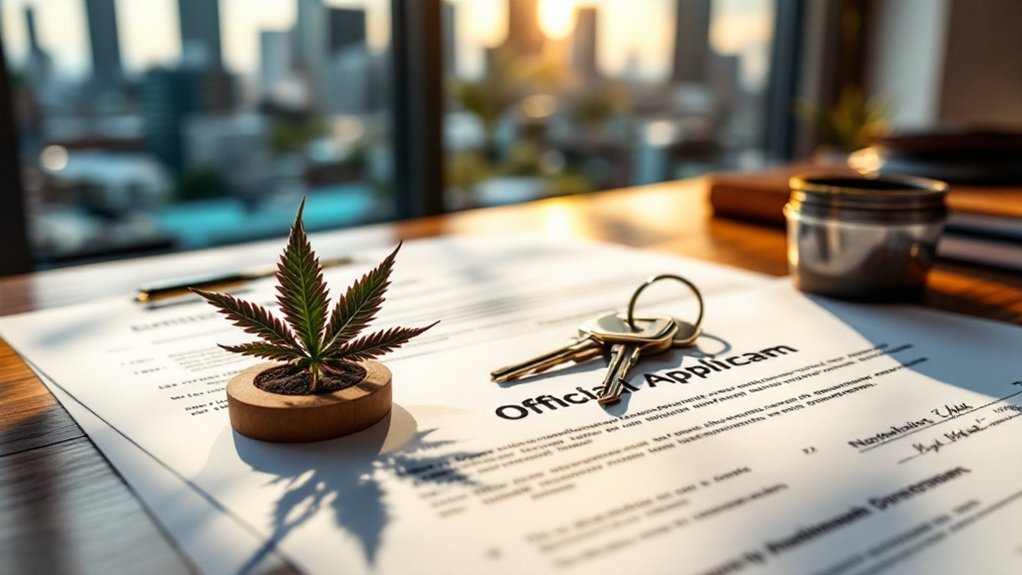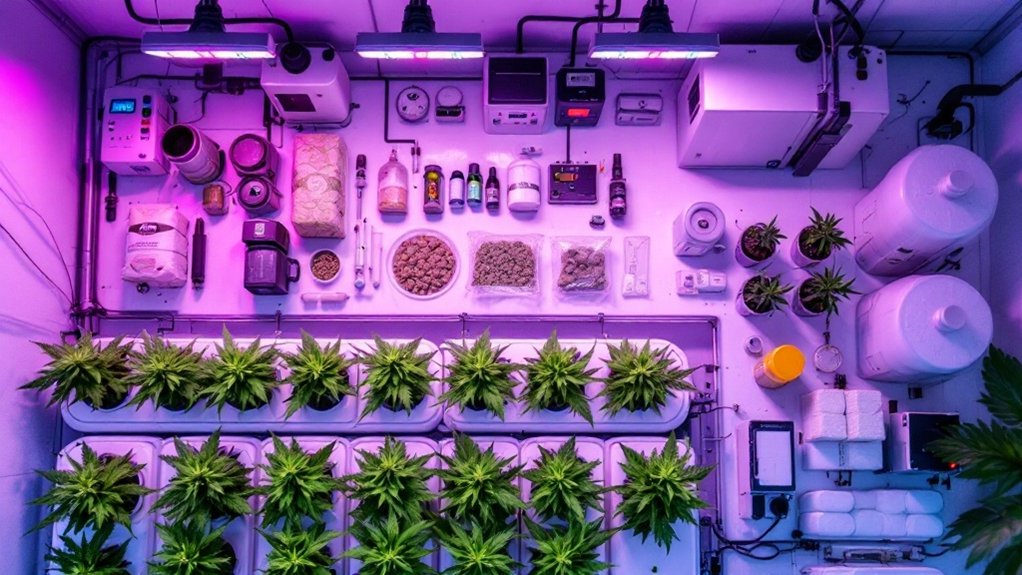To qualify for cannabis social equity programs, applicants typically need 51% or more ownership by individuals from communities disproportionately impacted by cannabis prohibition. Eligibility often requires proof of previous marijuana convictions or residency in historically targeted areas defined by arrest data. Most programs mandate a valid dispensary license and startup capital averaging $250,000. Application processing takes 3-5 weeks and requires documentation of majority ownership. The specific criteria vary considerably between states, with each jurisdiction offering different benefits for successful candidates.

Why do cannabis social equity programs exist, and who can benefit from them? Cannabis social equity programs were created to address historical injustices related to the War on Drugs, which disproportionately affected certain communities. These programs aim to promote equitable ownership and employment opportunities in the cannabis industry for individuals from groups that faced higher rates of criminalization during cannabis prohibition. The programs seek to create sustainable pathways into the cannabis industry while supporting local economic development in the most affected communities.
Qualifying for these programs typically requires applicants to meet specific eligibility criteria. Most programs mandate that 51% or more of a cannabis business be owned by individuals from communities disproportionately impacted by cannabis prohibition. This ownership threshold guarantees meaningful participation from affected groups rather than token inclusion.
Social equity means real ownership, not symbolic inclusion, through strict 51% minimum requirements for impacted communities.
Applicants with previous marijuana convictions that did not involve selling to minors or violent crimes may also qualify, recognizing that many individuals have criminal records solely due to activities that are now legal in many states. Residency requirements constitute another common eligibility factor. Living in areas historically targeted during cannabis prohibition often serves as a qualifying criterion, with each state defining specific geographic zones based on historical arrest and incarceration data.
For example, Illinois specifically requires at least 51% ownership by individuals from disproportionately impacted communities, while Maryland considers an individual’s personal history of being affected by cannabis prohibition. In Los Angeles, the Social Equity Program was established to address how disparate enforcement of laws has led to long-term harms in low-income and minority communities.
The application process involves several components that prospective applicants should understand. City policies actively work to foster inclusion in the cannabis business community through various support programs. Applicants typically need a legal dispensary license in a supported market to qualify for many equity programs. Despite program assistance, new businesses generally require approximately $250,000 in startup capital.
Application processing times average 3-5 weeks in many jurisdictions, and proof of majority ownership in the cannabis business is typically required as part of the documentation.
Successful applicants receive various benefits, including preferential licensing, employment preferences, technical assistance, and training programs. Some states, such as California, offer additional support through automatic expungements for certain qualifying cannabis convictions via the 2018 AB1793 law. Ohio provides a statewide technical assistance program, while Missouri offers financial assistance and license application benefits.
Despite these initiatives, challenges remain. High startup costs continue to pose significant barriers to entry, and many preferential licensing programs have not fully achieved their intended equity outcomes. These limitations highlight the ongoing need for program refinement to better serve communities harmed by prohibition.
Frequently Asked Questions
What Happens if My Application Is Denied?
If an application is denied, applicants have multiple recourse options. They can pursue administrative appeals within the regulatory agency, seek judicial review through courts, or file legal petitions challenging procedural errors.
Denied applicants typically receive instructions for reapplying in future licensing windows, with some jurisdictions maintaining waiting lists or offering priority status.
Denials may stem from documentation failures, missed deadlines, license limit constraints, or criminal history issues. Engaging with advocacy organizations can improve prospects for subsequent submissions.
Can I Transfer My Social Equity License to Someone Else?
Social equity license transfers are typically restricted by state regulations to prevent exploitation.
Most states impose waiting periods before transfers can occur, and recipients often must qualify independently as social equity applicants.
Transfer fees range from $5,000 for ownership changes in Illinois to substantial fees in California ($1 million for dispensaries).
Regulatory approval is required for any transfer, with authorities evaluating whether the change maintains program integrity.
Some states allow partial fee waivers when transfers preserve social equity partnerships.
How Long Does the Application Review Process Typically Take?
Application review processes for social equity licenses typically take 3-5 weeks for privately administered programs, while government-run programs often have longer, undefined timelines.
The review follows multiple phases, including registration, eligibility verification, documentation evaluation, and final notification.
High application volumes (300+ applicants), incomplete submissions, mandatory background checks, and regulatory changes can greatly extend this timeline.
Applicants generally receive status updates at key milestones rather than continuous progress reports.
Are There Ongoing Compliance Requirements After Approval?
Social equity licensees face substantial ongoing compliance obligations after approval.
These requirements typically include maintaining qualifying ownership percentages, submitting regular financial and operational reports, and adhering to evolving regulations.
Licensees must demonstrate continued eligibility through periodic documentation, participate in mandated training programs, and fulfill community impact commitments.
State agencies conduct routine audits to verify compliance with seed-to-sale tracking systems and operational standards.
Failure to meet these obligations may result in penalties or license revocation.
Can I Apply to Multiple Social Equity Programs Simultaneously?
Applicants can indeed apply to multiple cannabis social equity programs simultaneously, though this requires careful management of resources and documentation.
Each jurisdiction operates with distinct qualification criteria, application timelines, and ownership requirements that must be separately satisfied. The varying eligibility standards across programs necessitate thorough preparation of different verification documents for each application.
Financial considerations are significant, as maintaining sufficient capital reserves for multiple application fees and program requirements is essential for successful participation.









